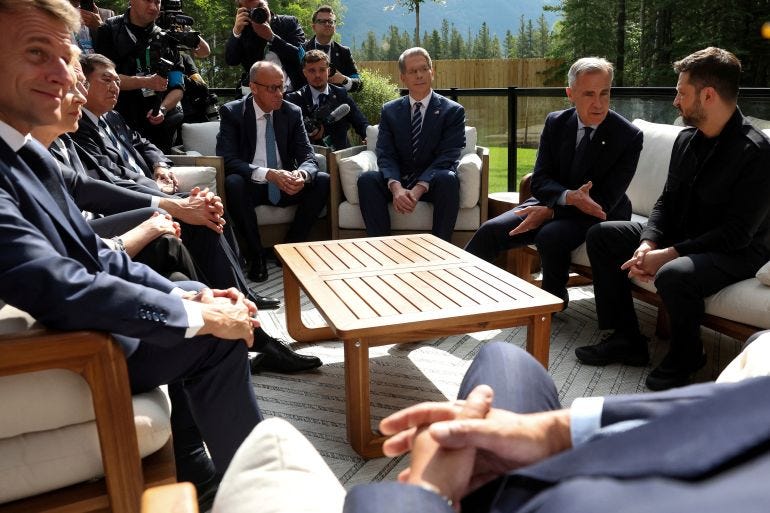The Other Thing Happening This Week
The G7 was the final test for Trump's willingness to sanction Russia. He failed the test
For some reason, Donald Trump hates the G7. Perhaps it’s because it forces him to be treated as an equal with leaders of nations that he looks down on - stodgy democracies like France, Canada, Germany, Italy, the UK and Japan, not the exciting blingy dictatorships in the Gulf where he thinks he can make a trillion dollar deal. Perhaps it’s because the G7 was the G8 until Russia was booted out for invading Ukraine - in 2014 - and Trump has been complaining about that for years, strangely upset by the implied slight to his friend in Moscow. He repeated this complaint during his brief appearance at the G7 this year, before walking out early “because of what’s going on in the Middle East”.
Trump’s early departure meant that the slight possibility of the G7 signing up to enhanced sanctions against Russia is now out of the question. Since sanctions only work when the USA is involved (due to the dominance of the US dollar in international payment systems) this lets Russia off the hook. I have repeatedly been told by various government officials that 2025 is the year that Russia’s economy really hits the buffers due to the years of sanctions and the ruinous costs of its war on Ukraine, with an attendant impact on the war itself. But this has always assumed the existence of a co-operative White House, something which can no longer be taken for granted given Trump’s pro-Russian stance.

The only hope remaining has been a bipartisan Senate bill proposed by Republican Lindsay Graham and Democrat Richard Blumenthal which promises “bone-crushing sanctions” on Russia. Prior to Israel’s strikes on Iran, Graham, whose fealty to Trump is so extreme it has led many to speculate that he is being blackmailed, was talking unusually tough about the need to confront Russia. He has now gone rather quiet. Perhaps the White House has reminded him who’s in charge.
On one level, the refusal of Donald Trump to put further sanctions on Russia might seem like the least surprising thing in the world. But, believe it or not (and I’ve struggled to believe it myself at times) within western countries’ governments, there has been this idea that Trump might come round to sanctions once it was clear that Putin wasn’t remotely interested in the peace track. As recently as last week I was hearing from western officials that this was a firm idea which just needed finalising at the G7 summit. That moment has now passed. Barring Lindsay Graham finding his backbone for the first time since 2016, we must accept that there is no chance of serious western sanctions on Russia for as long as Trump is in the White House.
It’s not that the general public needs much further evidence that Trump is beholden to Putin. But, interestingly, it seemed that the governments of what used to be America’s closest western allies, did. Now there is no question of where Trump’s loyalties lie, will they change their approach to Ukraine?



